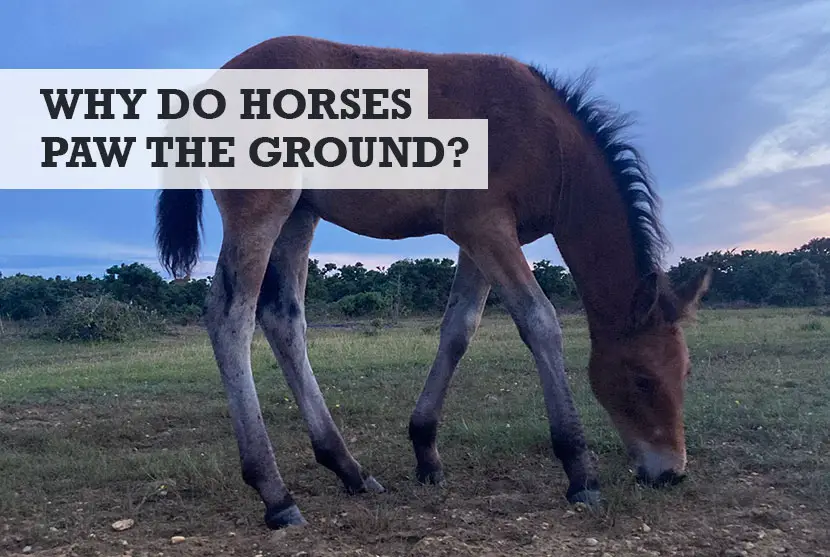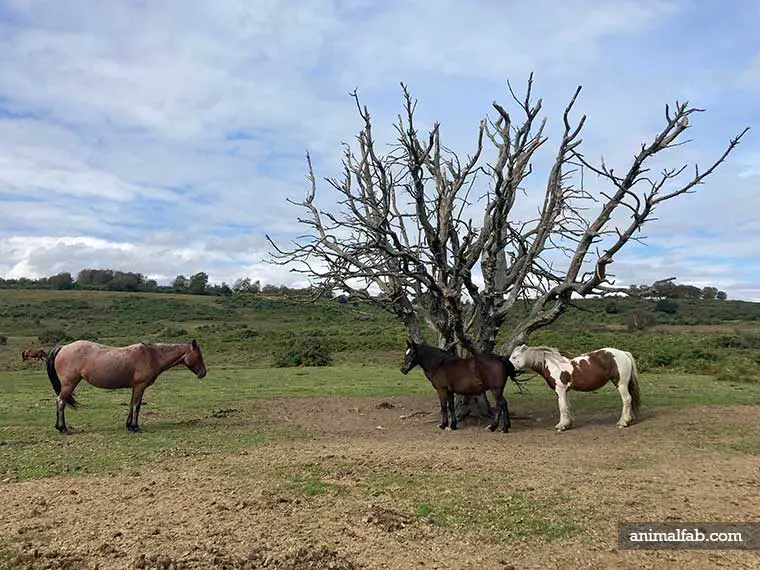Unveiling The Mystery: Why Do Horses Paw At The Ground?
Horses pawing at the ground is a behavior that has intrigued horse enthusiasts and experts for centuries. This natural instinct can signify various emotions, needs, or physical states in a horse. Understanding why horses paw at the ground is essential for horse owners and caretakers to ensure their well-being and address any underlying issues promptly. Whether it's frustration, boredom, or a physiological response, recognizing the context of this behavior helps build a stronger bond with your equine companion.
As an age-old behavior, pawing at the ground can communicate a lot about a horse's state of mind. It might indicate impatience, anticipation, or even discomfort. By observing the frequency and intensity of this action, horse owners can better interpret their animal's needs and respond accordingly. This article delves into the reasons behind this behavior, offering valuable insights for those seeking to understand their horses better.
From a scientific perspective, the act of pawing at the ground has evolutionary roots tied to survival instincts. It's not merely a random action but a form of communication that horses have used for generations. Learning why horses paw at the ground provides a deeper understanding of equine psychology and behavior, enabling owners to provide the care and environment their horses need.
Read also:Jennifer Kish Goggins Wife Exploring Her Life Influence And Contributions
What Does Pawing at the Ground Indicate?
When observing a horse pawing at the ground, one might wonder, "Why do horses paw at the ground?" This behavior can signify several things, ranging from impatience to discomfort. For instance, if a horse is pawing while waiting to be fed, it could indicate anticipation or frustration. In contrast, if the horse is pawing excessively in its stall, it might be a sign of boredom or stress. Recognizing these subtle cues can help horse owners respond appropriately and maintain their horse's health and happiness.
Why Do Horses Paw at the Ground When They Are Stressed?
Stress is one of the primary reasons why horses paw at the ground. When a horse feels anxious or tense, it may resort to this behavior as a coping mechanism. Environmental changes, such as moving to a new stable or introducing new animals, can trigger stress-related pawing. Understanding the root cause of stress in horses is crucial for preventing this behavior from becoming habitual or harmful.
Why Do Horses Paw at the Ground When They Are Hungry?
Hunger is another common reason for pawing at the ground. Horses often paw when they anticipate food, especially if they are kept on a strict feeding schedule. This behavior can be managed by providing enrichment activities or adjusting feeding times to reduce anticipation-related frustration. Ensuring that a horse's dietary needs are met can help minimize unnecessary pawing.
What Are the Potential Health Concerns Associated with Pawing?
Pawing at the ground can sometimes indicate underlying health issues. For example, horses suffering from gastric discomfort or colic might paw excessively as a sign of distress. It's essential for owners to monitor this behavior closely and consult a veterinarian if necessary. Regular health check-ups and a balanced diet can help prevent health-related pawing.
Why Do Horses Paw at the Ground When They Are in Pain?
Pain is a significant factor that can lead to pawing at the ground. Whether it's hoof pain or general discomfort, horses may use this behavior to express their distress. Identifying and addressing the source of pain promptly can prevent further complications. Owners should be vigilant and seek professional advice if they suspect their horse is pawing due to pain.
How Can Owners Prevent Excessive Pawing?
Preventing excessive pawing involves creating an environment that meets a horse's physical and mental needs. Providing ample space for movement, engaging toys, and regular social interaction can help reduce boredom-related pawing. Additionally, maintaining a consistent routine and addressing any health concerns can contribute to a more contented horse.
Read also:Corrina Jagger A Glimpse Into The Life Of Mick Jaggers Mother
What Are the Benefits of Understanding Why Horses Paw at the Ground?
Understanding why horses paw at the ground offers numerous benefits for both the horse and its owner. It enhances communication between the two, allowing for better care and management. By recognizing the reasons behind this behavior, owners can address potential issues before they escalate, ensuring their horse remains healthy and happy.
Why Do Horses Paw at the Ground in Social Situations?
Social interactions can also trigger pawing at the ground. Horses may paw when they feel threatened or challenged by other animals in their environment. This behavior can be a way of asserting dominance or expressing discomfort. Observing and managing social dynamics within a herd can help reduce unnecessary pawing and promote harmony among horses.
What Are Some Common Myths About Pawing?
There are several myths surrounding why horses paw at the ground. Some believe it's purely a destructive behavior, while others think it's just a bad habit. However, understanding the underlying causes dispels these myths and highlights the importance of addressing the root cause rather than simply discouraging the behavior. Educating oneself about equine behavior can lead to more effective management strategies.
What Are the Long-Term Effects of Pawing?
While occasional pawing is normal, excessive pawing can have long-term effects on a horse's health and well-being. It can lead to hoof damage, soil erosion, and even behavioral issues if left unchecked. Implementing strategies to manage and reduce pawing can prevent these negative outcomes and ensure a healthier, happier horse.
How Can Owners Encourage Positive Behaviors Instead of Pawing?
Encouraging positive behaviors is key to reducing pawing at the ground. This can be achieved through training, enrichment activities, and creating a stimulating environment. Providing mental and physical challenges can distract horses from pawing and promote healthier habits. Owners can also reward desired behaviors to reinforce positive actions.
What Are the Key Takeaways About Why Horses Paw at the Ground?
In conclusion, understanding why horses paw at the ground is vital for ensuring their well-being. Whether it's due to stress, hunger, pain, or social interactions, recognizing the context of this behavior allows owners to respond appropriately. By addressing the underlying causes and implementing preventive measures, horse owners can minimize unnecessary pawing and promote a healthier, more harmonious relationship with their equine companions.
Why Do Horses Paw at the Ground: Final Thoughts
Pawing at the ground is a natural behavior that communicates a horse's needs and emotions. By paying attention to this behavior and understanding its significance, owners can provide the care and environment their horses require. Building a strong bond with your horse involves interpreting these subtle cues and responding with empathy and knowledge, ensuring a lifetime of mutual trust and understanding.
What Steps Can Owners Take Today to Address Pawing?
Owners can start by observing their horse's behavior closely and identifying any patterns or triggers. They can then implement strategies such as enriching the horse's environment, adjusting feeding schedules, and addressing any health concerns. Regular communication with veterinarians and equine behaviorists can also provide valuable insights and support in managing this behavior effectively.
Table of Contents
- What Does Pawing at the Ground Indicate?
- Why Do Horses Paw at the Ground When They Are Stressed?
- Why Do Horses Paw at the Ground When They Are Hungry?
- What Are the Potential Health Concerns Associated with Pawing?
- Why Do Horses Paw at the Ground When They Are in Pain?
- How Can Owners Prevent Excessive Pawing?
- What Are the Benefits of Understanding Why Horses Paw at the Ground?
- Why Do Horses Paw at the Ground in Social Situations?
- What Are Some Common Myths About Pawing?
- What Are the Long-Term Effects of Pawing?


